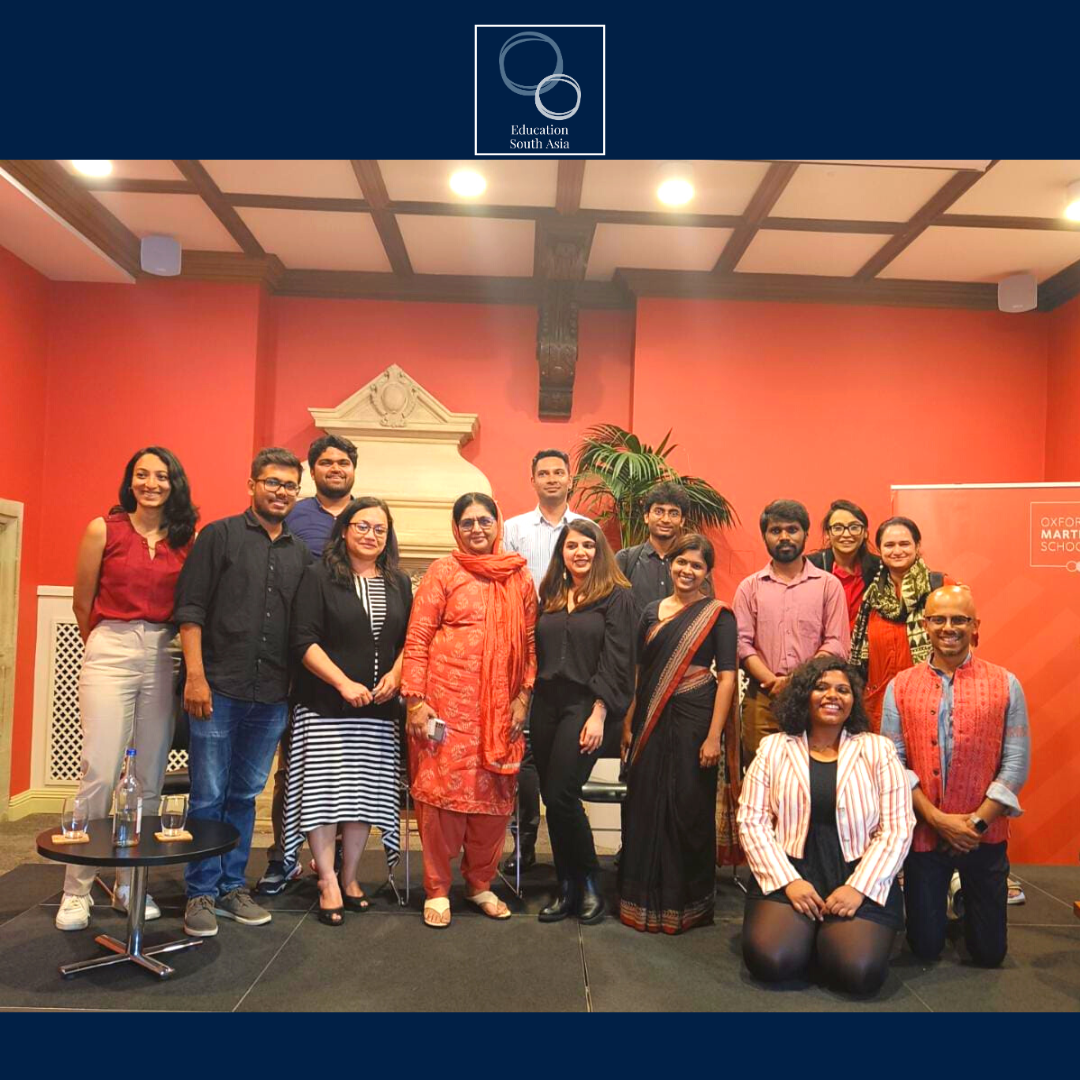
Language Futures in South Asia: Sustainability, Inclusivity, and Technology in Education
Recording: You can watch all the panels of the conference on our YouTube Channel here
Conference Booklet: You can download the booklet here

THANK YOU FOR ATTENDING THE ‘LANGUAGE FUTURES IN SOUTH ASIA’ CONFERENCE 2023!
Education South Asia hosted its second conference in partnership with University of Oxford, UCL Institute of Education, IndOx and the Oxford India Centre for Sustainable Development. Please find the details below:
In the postcolonial and multilingual context of South Asia, language remains a matter of social, political and economic concern. Be it the question of appointing a ‘national language’; drafting language policy; the status of dialects and unrecognised ‘mother tongues’; or the marginalisation of indigenous, tribal and minority (ITM) languages — the issue of language continues to pose a challenge to policymakers, academics, educators, and civil society alike.
Linguist and anthropologist Edward Sapir called language a “great force of socialisation, probably the greatest that exists” (1933). Given how closely linked language is to societal and individual identity, it will undoubtedly play an important role in the future of these regions. Language education, therefore, becomes a compelling site of study as it not only reinforces but constructs a social reality for students (Rahman 2002). As we move forward in a world gripped by urgent issues of climate change, collapsing social fabrics of South Asian nations along the fault-lines of inequality, and an increased role of technology and artificial intelligence in society, this conference will bring the future of language education into focus.
How does language education feature within the UN Sustainable Development Goals aimed at 2030? What is the language of sustainability in South Asia and does it determine which issues are covered in education? How will language learning and teaching develop in an era of AI, DuoLingo and ChatGPT? Does language-in-education policy play an important role in determining classroom dynamics and feelings of inclusion and exclusion in education spaces? This conference hopes to answer some of these questions during the course of one day, filled with expert keynotes and paper presentations.
Sub-themes:
- The language(s) of sustainability education
- Language education and sustainable development goals
- Language pedagogy and inclusivity in the classroom
- Social hierarchies and classroom dynamics in language education
- Language learning in the age of AI
- Technology and language teaching strategies
- Language policy, curriculum and teaching practices
- The future of language education in South Asia
Conference Date: 20th June 2023
Conference Timeline:
- 10th March 2023: Abstract submission
- 28th March 2023: Decisions communicated
Conference Venue: Oxford Martin School, University of Oxford, 34 Broad St, Oxford OX1 3BD
Conference Convenors:
- Uma Pradhan, University College London
- Mohini Gupta, University of Oxford
Conference 2023
-
Programme
-
Conference Panel Chairs
-
Team
| 9.30am | Registrations |
| 9.40am-10.00am | Welcome Note |
| 10.00am-11.30am | Panel 1: Language and Technology |
| 11.30am-11.45am | Tea Break |
| 11.45am-1.15pm | Panel 2: English Language and Education |
| 1.15pm-2.15pm | Lunch Break |
| 2.15pm-3.45pm | Panel 3: Language and Caste in India |
| 3.45pm-4.00pm | Tea Break |
| 4.00pm-5.30pm | Panel 4: Language and Politics |
| 5.45pm onwards | Evening Reception |
Detailed programme schedule here.
Professor Jieun Kiaer is the YBMK KF Professor of Korean Linguistics at the University of Oxford. She is a linguist, pragmatist, and Asian specialist who researches the future of human language in the context of social media behaviors, big data, and AI linguistics. Her work includes publications on pragmatic particles, emoji language, and syntax in the AI age, with a focus on Asian perspectives.
Abhishek Ranjan Datta is a DPhil candidate in International Development at the Oxford Department of International Development (ODID) as a Clarendon and Lincoln-Kingsgate Graduate scholar. His research interests include youth, education, language, media and politics in South Asia. His doctoral project explores practices of ‘self-making’ among urban youth in Delhi, focussing on how such processes of preparation and identity formation shape ideas of mobility and aspiration.
Surajkumar Thube is a 4th year DPhil candidate at the Faculty of History, University of Oxford. The title of his thesis is 'Print, Language and Counterpublics: The Marathi Public Sphere in Late Colonial Western India, ca. 1890-1940s'. His work focuses on the non-Brahmin print and performative sphere by analysing the content of their texts and writing styles. His work seeks to investigate both the radical and conservative streaks within non-Brahmin writers amidst their contestation of the hegemonic Brahmin writerly discourse.
Kusha Anand is an Associate Lecturer and Master Dissertation Lead at the UCL Institute of Education. As an international policy sociologist, she specialises in researching education reforms in India. She has recently published three books: Teaching India–Pakistan Relations, Delhi's Education Revolution, and Bridging Neoliberalism and Hindu Nationalism. Her research findings have been shared with policymakers and parliamentarians in the UK, Additionally, she has contributed to interdisciplinary research projects focusing on minorities, refugees, and migrants in the UK.
Conference Team:
Uma Pradhan (UCL Institute of Education)
Mohini Gupta (University of Oxford)
Marwa Ahmed (IndOx)
Vinita Govindarajan (Oxford India Centre for Sustainable Development)
Volunteers:
Neeraj Shetye (Oxford Internet Institute)
Abhishek Ranjan Datta (DPhil Candidate, University of Oxford)
